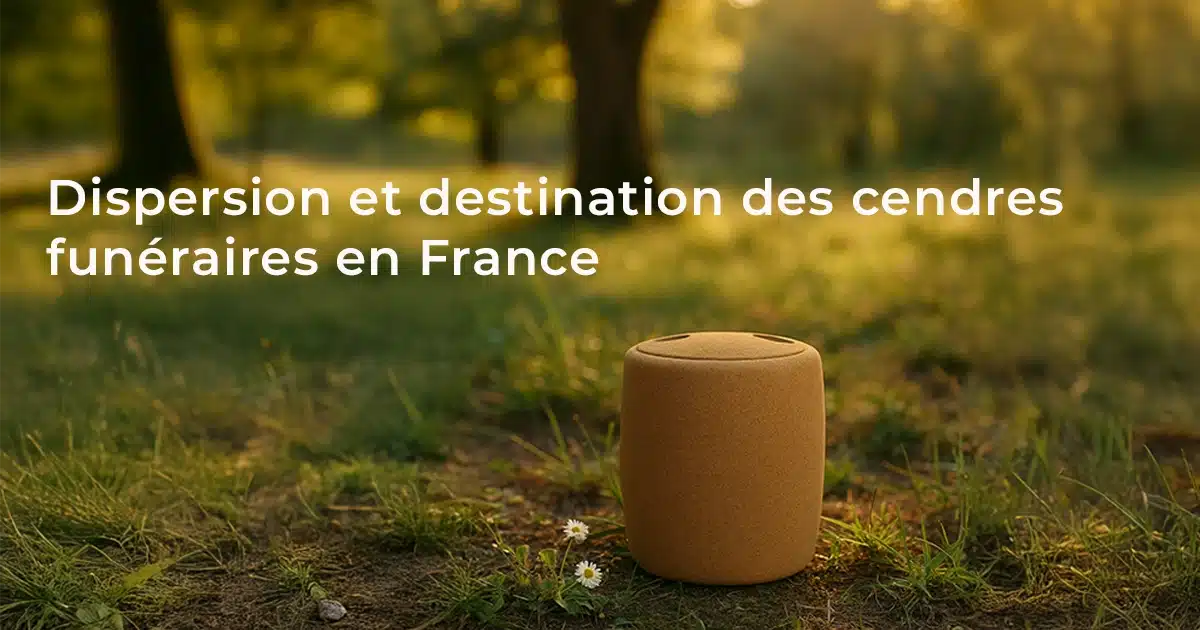Cremation in France is regulated by law, and families must decide on the ashes’ final destination. Options include scattering, burial, or placement in a memorial site. This guide explains the legal framework and the main choices available for ashes in France.
Cremation and Legal Requirements in France
- Cremation must be authorised by the mayor of the commune of death or where the coffin is placed before transport.
- It must take place within 14 days after death, in a licensed crematorium.
- The ashes are collected in an urn, labelled with the identity of the deceased and the crematorium.
- Keeping ashes at home is strictly prohibited. Families must choose a legal destination.
Cemetery and Memorial Site Options
Within cemeteries and official memorial spaces, families may choose:
- Burial of the urn in a grave, vault, or communal plot.
- Placement in a columbarium, with the possibility to personalise the niche.
- Sealing the urn onto a funerary monument.
- Scattering in a memorial garden (jardin du souvenir), a dedicated collective area.
➡️ Each destination must be declared at the town hall of the deceased’s birthplace, where the information is recorded in a registry.
Scattering Ashes in Nature
French law allows scattering in nature, but under conditions:
- The place must be open and not privately enclosed.
- Forbidden: scattering on public roads, parks, stadiums, or private gardens.
- At sea: permitted if regulations are respected; a biodegradable urn may be immersed.
- In rivers or lakes: restrictions may apply; check with the local authorities.
- On private land: possible with the owner’s consent.
Tree Urn: A Natural Form of Scattering
An innovative and ecological option is the use of biodegradable urns with a tree, such as Tree-Urn.
- The urn is made from natural materials that decompose in the soil.
- Ashes are mixed with the earth and nutrients, allowing them to integrate into the ground and feed the roots of a growing tree.
- Under French law, this process is considered a form of scattering, since the ashes return to nature rather than remaining in a permanent container.
- It creates a living memorial: the tree becomes a symbol of continuity, remembrance, and regeneration.
This option combines ecological responsibility with the creation of a meaningful place of remembrance for families.
For families wishing to choose this option in France, it is possible to bury a Tree Urn in dedicated memorial forests such as CIME Tree. You can learn more here: cime-tree.fr.
👉 If you want to learn more about how Tree Urn works as a biodegradable and compostable funeral urn, read our dedicated article here.
Temporary Storage of Ashes
If undecided, the urn can be stored for up to one year in a crematorium or place of worship (with consent).
After this period, ashes are automatically dispersed in a dedicated communal area.
Burial on Private Property
Urns may be buried on private land with prefectural authorisation. This creates a permanent family grave, with guaranteed access for heirs.
Metals from Cremation
Any prosthetics or implants are recovered separately and sold. By law, proceeds fund funerals for the indigent or go to charitable associations.
Conclusion
In France, the law provides several legal and respectful options for ashes: burial in a cemetery, placement in a columbarium, scattering in nature, or immersion at sea.
Among these, biodegradable urns like Tree Urn represent a modern and ecological way to scatter ashes, allowing them to return to the earth while giving life to a memorial tree. This practice not only respects the law but also offers families a lasting and symbolic place of remembrance.
👉 For more detailed information, you can consult the official French government website: service-public.fr
👉 For an overview of ashes scattering regulations across Europe, visit our dedicated guide: treeurn.eu
FAQ — Cremation and ashes in France (EN-UK)
1) Is it legal to keep ashes at home in France?
No. Home custody of ashes is prohibited. Families must choose an authorised destination under French law.
2) What are the legal destinations for ashes?
Within cemeteries: burial of the urn (grave/vault/communal plot), placement in a columbarium, sealing the urn onto a monument, or scattering in a memorial garden (jardin du souvenir). Each choice must be declared at the town hall of the deceased’s birthplace.
3) Where can ashes be scattered in nature?
Only in places that are open and not privately enclosed. Prohibited: public roads, parks, stadiums, private gardens. At sea is permitted if rules are respected (a biodegradable urn may be immersed). Rivers/lakes may have restrictions—always check local authorities. On private land is possible with the owner’s consent.
4) Is a biodegradable tree urn (Tree Urn) recognised under French law?
Yes. The gradual integration of ashes into the soil via a biodegradable urn with a tree is treated as a form of scattering (return to nature rather than permanent confinement), creating a living memorial.
5) Can an urn be buried on private property?
Yes, with prefectural authorisation. This creates a permanent family grave with guaranteed access for heirs.
6) How long can ashes be stored before deciding?
Up to one year in a crematorium or place of worship (with consent). After that period, unclaimed ashes are dispersed in a dedicated communal area.


0 Comments